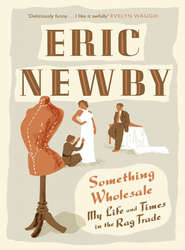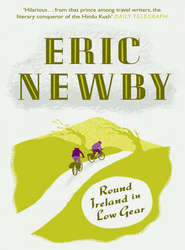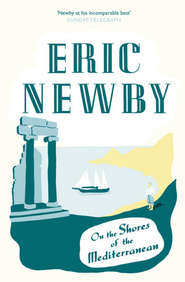По всем вопросам обращайтесь на: info@litportal.ru
(©) 2003-2024.
✖
A Merry Dance Around the World With Eric Newby
Автор
Год написания книги
2019
Настройки чтения
Размер шрифта
Высота строк
Поля
Further afield, as I turned the pages, covering them with Bovril (for one of my greatest pleasures was to go to bed early with Lands and Peoples and at the same time eat Bovril sandwiches), I came upon Czechs and Slovaks and Hungarians wearing embroidered petticoats irrespective of sex, and incredible hats – in Rumania there were men who wore garters with little bells on them, who looked like sissies to me. I also saw fellers of proud giants in the Canadian forest; savages of New Guinea – their hair plastered with grease and mud; Jews in Poland – a new state with a glorious past; sun-loving Negroes in South Africa; happy Negro children romping in the ‘Coloured Section’ of New York; Kirghiz tribesmen on the ‘Roof of the World’; Orthodox scholars wearing arm thongs and phylacteries studying the ancient laws of their people; penguin rookeries in the Great White South; geishas negotiating stepping stones in Cherry Blossom Land; hardy Indian women on beds of nails at Benares; laughter-loving girls of the Abruzzi; Flemings and Walloons – little Belgium’s two sturdy races; Macedonian women weaving fine cloth with deft fingers; haughty-looking redskins decked in eagle’s feathers and wampum; Germany – rich country of an industrious nation; and so on, and so on.
Everywhere in Lands and Peoples there were photographs of schools and schoolchildren; ruinous-looking schools in which little Negroes were learning to add up, schools in Japan with the pupils marching round in circles dressed in military-looking uniforms, clinical-looking schools in the United States in which the children were being inspected for dental decay, children brandishing enormously long slates in Burma, memorizing the Koran in oases, going to school in wheelbarrows in China, learning to read in lonely Labrador and being bastinadoed in Persia, one of the only examples of violence in the entire work. That children had to put up with going to school in other countries besides my own I found encouraging. And here at home they didn’t have the bastinado, even at Colet Court.
Each time I got through all six volumes of the Children’s Colour Book of Lands and Peoples I began again, in much the same way as the Scotsmen of Bonnie Scotland, sturdy independent folk, who painted the Forth Bridge, would start all over again as soon as they had applied the final brush strokes to that miracle of Scottish engineering.
At St Paul’s I became a Scout in order to avoid being drafted into the Officers’ Training Corps, the OTC, which would have meant wearing an insufferably itchy uniform that was blanket thick. As a Scout I learned to light a fire with one match and to use a felling axe without dismembering myself. On Saturdays we engaged in bloody night battles with other troops of Scouts in the swamps of Wimbledon Common. In the holidays we went camping in the beautiful parks of gentlemen’s country seats. Because I got on with Jews – I still do, I think they find my lack of subtlety restful – I was given command of a Jewish patrol. One of them, who was as prickly as a present-day Israeli, refused to wear Scout uniform and appeared at our open-air meetings wearing a double-breasted overcoat, a bowler hat and carrying a rolled umbrella. Another, who used to charge his mother half a crown to kiss him good night, was always loaded down with silver. On one occasion, when there was a danger of our losing one of the outdoor games known as ‘wide games’ (which necessitated covering large tracts of ground on foot) another member of my patrol whose family owned a huge limousine in which he used to arrive at wherever was the meeting place, summoned the chauffeur who was parked round the corner, and six scouts whirred away in it to certain victory.
In the spring of 1936, when I was sixteen years old, my father announced that, as it appeared unlikely I would pass the School Certificate Examination (the then equivalent of O-levels), in mathematics, a subject in which it was obligatory to pass, he had decided to take me away from St Paul’s at the end of the summer term and ‘put me into business’. I did fail. I was sorry about this decision. I was good at English, History, even Divinity, and I had dreamed of reading History at Oxford.
Apart from an innate inability to cope with mathematics the only disadvantage I laboured under at St Paul’s, and being a Scout made not the slightest difference, was that I had a curious sense of humour which meant that if anything came up in class with a suggestion of double entendre it caused me to dissolve into hysterics, for which I was punished, sometimes quite severely. In other words I had a dirty mind.
For instance, on one occasion, when we were reading Scott’s Marmion aloud, it became obvious to myself and everyone else in the classroom that by the working of some hideously unfair natural process of selection it would fall to me to read a completely unreadable part of the romance in Canto Two, entitled ‘The Convent’, which concerned the blind Bishop of Lindisfarne. And you could have heard a pin drop when I got to my feet.
‘No hand was moved, no word was said
Till thus the Abbot’s doom was given.
Raising his sightless balls to heaven …’
was all I could manage before going off into peals of mad laughter and to be beaten by John Bell, the High Master, a hedonist who showed in as marked a way as possible in the circumstances where his sympathies lay by beating me as hard as anyone else sent to him for punishment, and then giving me a shilling. I have never forgiven Scott.
(#ulink_ce7de623-9c0d-56d3-a8b4-b53b53edad50) All sums of sterling have been converted from pounds, shillings and pence to their decimal equivalents and to American currency of the time.
(#ulink_8f12840e-00ff-54c1-906f-023f39919e4b) It was originally intended that the church should be built at the foot of the hill near the site of the present village. However, when work was begun on it, the plan was vetoed by a band of local fairies. As a practical expression of their objection whenever the walls reached a particular height they proceeded to knock them down and carry the stones up to the top of the hill where they rebuilt the walls, after which they danced round them in a ring. After this had happened three times, the workmen who had on each occasion been forced to demolish the walls, carry the stones back down the hill and then build them up again in the low ground, lost heart and decided to build the church where the fairies wanted it to be built. As a result of this wise decision there was much jubilation among the fairies and when the church was finally completed they held a great fête on top of the hill to celebrate their victory, the sounds of their revelry being audible at a considerable distance.
In and Out of Advertising (#ulink_8e18f66b-a4d9-5051-8b0b-2e2226a286cb)
IN THE SUMMER OF 1936, my father took me away from school and put me into a large, West End advertising agency.
Two years later, on the day we lost the Cereal Account, I finally decided to go to sea.
‘You’ve ’ad it,’ said the Porter with gloomy relish as I clocked in a little after the appointed hour. I was not surprised. My father had known the Chairman, George Wurzel, in his earlier, more uncomplicated days and had placed me with him in the fond belief that the sooner I got down to learning business methods the better. By now they were beginning to feel that they might have been wrong. Wurzel’s had long held a similar opinion. Since I had ridden a bicycle into the office of Miss Phrygian, the secretary of the managing director, they had been more than cool. Julian Pringle, the most rebellious copywriter Wurzel’s ever had, bet me that I could not ride it round the entire building without dismounting. The coast had been clear, the numerous swing doors held open, and the bicycle, which was being sketched for the front page of the Daily Mail, borrowed from the Art Department.
I had started my uneasy career in the Checking Department at the age of sixteen. Miss Phrygian had escorted me there. On the way we passed the Porter’s cubby hole; inside, half a dozen evil-looking messenger boys were waiting to take blocks to Fleet Street. There were more seats than messenger boys and I found Miss Phrygian casting a speculative look at the empty places. For a moment I thought she was going to enlist me in their ranks, but she must have remembered my father’s insistence on the value of the business methods I was going to learn, and we passed on.
In the narrow, airless transepts of the Checking Department, where the electric lights burned permanently, I thumbed my way through the newspapers and periodicals of the world to make sure that our advertisements were appearing on schedule and the right way up, which they failed to do quite frequently in some of the more unsophisticated newspapers from rugged and distant parts of the globe. Some of the advertisements had to be cut out and pasted in a book. We always cut out Carter’s Little Liver Pills, but I never discovered the reason. Turning the pages of thousands of newspapers day after day, I accumulated knowledge of the most recondite subjects – croquet matches between missionaries in Basutoland, reports of conventions of undertakers at South Bend, Indiana, great exhibitions for tram ticket collectors in the Midlands – the world spread out before me.
When I was not speculating about what I read, I would fight with Stan, a great dark brute of a boy, one of the two assistants in the Department, to whom I had become quite attached. Both Stan and Les, the second assistant, called me ‘Noob’.
‘’Ere, Noob, what abaht a pummel?’ Stan would croak invitingly, and we would pummel one another until Miss Phrygian banged furiously on the frosted glass of her office door to stop the din.
From time to time we would be visited by the Contact Men who dealt personally with Wurzel’s clients and handled the advertising accounts. They would stand gingerly in our den and turn the pages of the glossy magazines with beautifully manicured fingers. They were all youngish, perfectly dressed in Hawes and Curtis suits, and they smelled of bay rum. The amorous complications of their private lives were hair-raising. One of them owned a Bentley. They all wore clove carnations every day except Saturdays when they were in tweeds and went to the ‘country’ around Sunningdale. I always felt a clod in their presence and for some time after their visits disinclined to pummel. More popular were the visits of the typists. Wurzel’s was run on pseudo-American lines and had a splendid collection. Two of the most popular were Lettice Rundle and Lilly Reidenfelt. Lilly was the more provocative of the two. It was generally conceded that Lettice was the sort of girl you married and had children by after trying Miss Reidenfelt, who was expected to run to fat.
When Miss Reidenfelt entered the Checking Department, Stan, the Man of Action, would be stricken dumb and with eyes cast down would trace bashful circles amongst the waste paper with his toe. Les, Socialite and Dreamer, knew better how to please, and, more forthcoming, usually succeeded in pinching her. At such times what little air there was would be so heavy with lust that I would develop an enormous headache of the kind usually brought on by thundery weather. When Miss Reidenfelt had finally minced away inviolate, Stan would fling himself at the piles of newspaper in the steel fixtures and punch them in torment, crying: ‘Oh, you lovely bit of gravy.’
With such experiences behind me it was easy to believe the Porter when he said I was going to be sacked, and when I went into the main office through the swing doors in the reception counter I was filled with strangely pleasant forebodings. By this time the place would normally have been a Babel, but this morning the atmosphere was chilly, tragic, and unnaturally quiet. Lettice Rundle was having a good cry over her Remington and the group of young men who handled the Cereal Account were shovelling piles of proofs and stereos into a dustbin and removing their personal belongings from drawers. Years later I was to witness similar scenes in Cairo when Middle East headquarters became a great funeral pyre of burning documents as the Germans moved towards the Delta. But this was my first experience of an evacuation.
It was easy to see that besides myself quite a number of people were about to leave. Those remaining pored over their tasks with unnatural solicitude and averted their eyes from their unfortunate fellows. I had no personal possessions to put together. My hat was in the cloakroom where it had remained for two years. I had never taken it out but sometimes I dusted it, as Mr McBean from time to time checked up on the whereabouts of the more junior and unstable members of the staff by identifying the hats in the cloakroom. This was my alibi; with my hat in its place I was permanently somewhere in the building.
Before they left I asked them why I had not been sacked with the rest of them. Robbie only called you ‘old boy’ in moments of stress. He was reluctant to answer my question. He called me ‘old boy’ now.
‘Well, old boy, they did think about it but they decided that it cost them so little that it didn’t make any difference whether you stayed or not.’
I was furious. The Porter had been wrong and I hadn’t ‘ad it’. I was perhaps the only member of the staff who would have actively welcomed the sack. Wurzel’s was a prison to me. All the way home in the Underground I seethed … too unimportant to be sacked … At Piccadilly the train was full but the guards packed in more and more people. At Knightsbridge two of them tried to force an inoffensive little man into the train by putting their shoulders to the back of his head and shoving. Someone began to Baa loudly and hysterically. There was an embarrassed silence and nobody laughed. We were all too much like real sheep to find it funny.
At Hammersmith where I emerged sticky and wretched from the train, I found that we had been so closely packed that somebody had taken my handkerchief out of my pocket, used it, and put it back under the impression that it was his own.
I bought an evening paper. It had some very depressing headlines about the breakdown of Runciman’s negotiations at Prague.
The next day I went to Salcombe for my holiday. During that fortnight while swimming in Starehole Bay I dived down and saw beneath me the remains of the four-masted barque Herzogin Cecilie lying broken-backed, half buried in the sand.
On my way back to London there was an hour to wait for the connection at Newton Abbot, and wandering up the hot and empty street in the afternoon sunshine I went into a café and wrote to Gustav Erikson of Mariehamn for a place on one of his grain ships.
I never went back to Wurzel’s.
Around the World in a Four-masted Barque (#ulink_17244d05-8f77-5a52-9cb7-85c1d690842a)
WHEN I RETURNED from my holiday, events started to happen with increasing momentum so that I began to feel like the central figure in one of those films of the twenties, in which the actors flash in and out of buildings in the twinkling of an eye. With suspicious promptness a letter arrived from Gustav Erikson in Mariehamn, in which that man of iron told me to get in touch with his London Agents, Messrs H. Clarkson of Bishopsgate.
Captain Gustav Erikson of Mariehamn, ‘Ploddy Gustav’ as he was known more or less affectionately by the men and boys who sailed his ships, was in 1938 the owner of the largest fleet of square-rigged deep-water sailing vessels in the world. The great French sailing fleet of Dom Borde Fils of Bordeaux had melted away upon the withdrawal of government subsidies in the twenties; only two barques, Padua and Priwall, still belonged to the once great house of Laeisz of Hamburg; Erikson remained. He was not only the proprietor of twelve four- and three-masted barques, he also owned a number of wooden barquentines and schooners, the majority of which were engaged in the ‘onker’ (timber) trade in the Baltic and across the North Sea.
There were still in 1938 thirteen vessels entirely propelled by sail, engaged in carrying grain from South Australia to Europe by way of Cape Horn. There were other cargoes for these ships: timber from Finland to East Africa, guano (a sinister kind of bird dung) from Mauritius and the Seychelles to New Zealand, and very rarely, for the two remaining German barques, cargoes of nitrate from Tocopilla, Mejillones, and other ports on the Chilean Coast to be carried round the Horn to Hamburg. But for the most part the outward voyages from Europe to South Australia round the Cape of Good Hope and across the Southern Indian Ocean were ballast passages. Grain was the staple cargo. If that failed most of these thirteen ships would soon be rusting at forgotten anchorages.
The survival of the big sailing ships in this trade was due to several favourable circumstances. Grain was not dependent on season, neither was it perishable. In the primitive ports of the Spencer Gulf, where the grain was brought down from the back blocks in sacks, steamers found it difficult to load a cargo in an economical time. Although at some ports there were mile-long jetties, in most places the grain had to be brought alongside the ships in lightering ketches and slung into the hold with the vessel’s own gear, which might, and frequently did, take weeks. But a sailing ship run with utmost economy and a low-paid crew could still in 1938 take six weeks to load her cargo of grain, reach Falmouth or Queenstown for orders after 120 days on passage and still make a profit on a round voyage of about 30,000 miles, the outward 15,000 having been made in ballast.
At the time I went to sea Erikson was sixty-five years old. Unlike most twentieth-century shipowners he had been a sailor with wide practical experience before he had become a shipowner. At the age of nine he had shipped as a boy aboard a vessel engaged in the North Sea trade. Ten years later he had his first command in the same traffic and then, for six years, he had shipped as mate in ocean-going ships. Between 1902 and 1913, when he finally left the sea to concentrate on being an owner, he was master of a number of square-rigged vessels.
If I had imagined that Clarkson would be impressed when I approached them, I should have been disappointed. I was one of a number of Englishmen who applied to join the Grain Fleet every year, and Clarkson could not know that I was to be one of the last. From this small mahogany-bound office, saved from being prosaic by the numerous pictures of sailing ships on the walls, they looked after the destinies of practically every grain sailer in the world. Even the Germans came to Clarkson. In 1937 they fixed the high freight of 42s 6d a ton for the Kommodore Johnsen. Most cargoes were for British ports and Clarkson fixed the freights. Erikson was well served by them.
I learned some of these things from a little white-haired man, who said that to make the voyage at all I must be bound apprentice and pay a premium of fifty pounds. He made no suggestions except that I would probably be better advised not to go at all. I left Bishopsgate with a form of indenture which among other provisions stipulated that my parents were to bind me to the owner for eighteen months or a round voyage; that if I deserted the ship in any foreign port my premium would be forfeited; that if I died or became incapacitated, a pro-rata repayment of premium could be claimed; that I should receive 120 Fin-marks (10s) a month, and that I should be subject to Finnish law and custom.
This document my father reluctantly signed after hopelessly trying to discover something about Finnish law and custom. I remember that he was particularly concerned to find out whether the death penalty was still enforced and in what manner it was carried out. Even more reluctantly he paid out £50 and sent off the Indentures with two doctors’ certificates attesting that I was robust enough for the voyage, and one from a clergyman which stated that I was of good moral character. By this time I began to feel that I was destined for Roedean rather than the fo’c’sle of a barque.
Then, towards the end of September, I received a letter from the owner’s agents telling me to join the four-masted barque Moshulu which was discharging its cargo of grain in Belfast.
S/V Moshulu, East Side, York Dock, Belfast
26 September 1938
Dear Mummy and Daddy,
… I was up on deck on the steamer from Heysham about 6.30 just in time to see the terrifically high masts of the Moshulu rising high above the dock sheds and looking very cold and remote in the early morning. After breakfast in the steamer I took a very ancient taxi that was practically falling to pieces to the ship and when it arrived alongside it was so big that I felt like a midget. It is more than three thousand tons and is the biggest sailing ship in commission in the world.
I went up a gang plank and spoke to a very tough-looking boy with slant eyes like a Mongolian who was oiling a donkey engine, and asked him if he would help me with my enormous trunk. He picked it up, having made threatening gestures at the taxi man who was trying to overcharge me, and carried it up the plank on his back all by himself!
Meanwhile, sacks of grain were being hoisted out of the hold and weighed before being taken ashore and into the sheds – altogether the ship brought back more than sixty-two thousand sacks from South Australia on this last voyage and was a hundred and twenty days at sea, which is rather slow. A hundred days from Australia to Britain is good, anything under a hundred, very good.
Then my new friend, Jansson, who comes from the Åland Islands, took me into the starboard fo’c’sle where I am to live until the watches are appointed, which will be on the day we go to sea. It is about thirty feet long and about thirteen feet wide, with wooden bunks from floor to ceiling, one above the other, like coffins with open sides. I am not sure how many but will tell you later. The boys seem pleasant enough, but not exactly gushing. About three-quarters of them speak only about a dozen words of English and some of those are swear words, which is twelve words more than I speak of Swedish which is the language in which all orders are given, rather than Finnish, which would be too difficult for non-Finns, I suppose. Swedish/Finns from the Åland Islands and Finns make up the majority of the crew.











